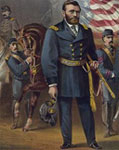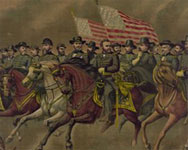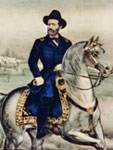
Persistence




Grant understood—like Lincoln—that the only way to win the war was to get the South to surrender. He was extremely persistent in pursuing this goal. He laid siege to the Mississippi town of Vicksburg for five months before getting the river stronghold to surrender. When he launched his ultimate campaign against Lee in May 1864, he quickly found himself in a stalemate with Lee. Grant suffered over 50,000 casualties that month alone.
Nevertheless, unlike previous Union commanders, Grant never retreated. He was the first Union commander to understand the value of persistence. While his men were dying, so too were Lee's; Grant knew that Lee's losses were irreplaceable. People in the North called Grant a "butcher," but his persistence ultimately won out.
Grant also had no problem inflicting damage on the South, both its military and civilian populations. His attacking style was ferocious and he did not care about Lee's past successes.
With his top generals, William Tecumseh Sherman and Philip Sheridan, he instituted a policy of total war that sought to starve the South into surrender. While his army pinned Lee down, he instructed Sherman to burn a path through Georgia and up the coast and for Sheridan to do the same in the Shenandoah Valley of Virginia. His orders to Sheridan were to, "Eat out Virginia clean and clear...so that crows flying above it will have to carry their own provender [food]." These tactics were ruthless, but by 1864, Grant was willing to do whatever it took to win.
Just as Lee showed grace in defeat, Grant showed graciousness in victory. At Appomattox, Grant insisted on the unconditional surrender of Lee's army. Yet, he also sent a significant supply of food to the Confederates and allowed Lee's men to keep their horses. He also pardoned Confederate officers and did not take any of them as prisoners of war. His treatment of Lee and the Army of Northern Virginia helped allow the nation to heal and set the tone for post-war America. Grant refused to allow his men to gloat over the defeated Southerners saying, "The rebels are our countrymen again."